A few years ago I went for a first date with a guy I met online. It was almost unreal how much we had in common. As we played Scrabble at a coffee shop we kept bringing up more and more things we had in common. At one point I asked if there was any foods he disliked, and he said no but that he was somewhat allergic to peanuts.
After the extended coffee we went for a walk and were having such a great time that we decided to tack on dinner, too. We went to a nearby sushi restaurant and the food was taking a really long time. My goma-ae came and I totally forgot about his allergy and offered him some. A few minutes later he stopped chatting so freely, and a few minutes after that he said, “Um, was there peanuts in that?”
I gasped and stammered that there probably was and I must’ve forgot. I was pretty mortified.
“Yeah, um, I might have to go throw up,” he said quietly.
I apologized over and over and he said, “Well on the bright side we found something we don’t have in common: I don’t think it’s ok to poison someone on the first date.”
I was chewing a piece of sushi when he said it, but I was so nervous I laughed out loud and spat rice across the table at him. It was a miracle we even ended up friends.
But as embarrassing as that date was, there could always be a worse date. There could always be a Geordi La Forge date.
But before I get into that part of the plot of “Galaxy’s Child,” first I want to talk about the other plot-line in the episode, which is that the Enterprise encounters a space-dwelling alien, which looks like a giant floating clam, and accidentally kills it. They quickly realize the alien was pregnant and lashed out at the Enterprise in self-defence. The fetus is still alive.
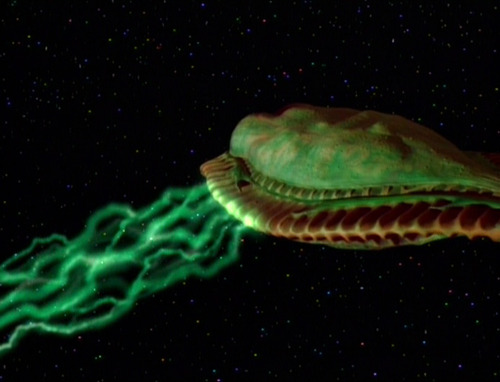
Crusher suggests delivering the baby alien by using the phasers to perform a C-section, despite knowing next to nothing about “the bio-functions of the adult, much less the child”. A minimum phaser blast killed the mother, so using phasers around the fetus doesn’t seem like a genius move.
However, the procedure is successful. But the baby immediately attaches itself to the Enterprise and starts draining its energy. Eventually, they manage to get “Junior” back to its relatives before it destroys the ship.
In her book Sexual Generations: “Star Trek: The Next Generation” and Gender, Robin Roberts looks at this part of the episode and how it relates to societal views of pregnancy and reproductive rights.
When they accidentally kill the mother, Picard is initially distraught (a great Patrick Stewart acting moment). Picard laments:
“We’re out here to explore, to make contact with other life forms, to establish peaceful relations but not to interfere. And absolutely not to destroy. And yet look what we have just done.”
But Roberts argues that it doesn’t take long before:
“Captain Picard is relieved that the existence of a fetus in some way mitigates the loss of the mother. There could be no clearer way of announcing that women’s worth exists in their ability to reproduce.”
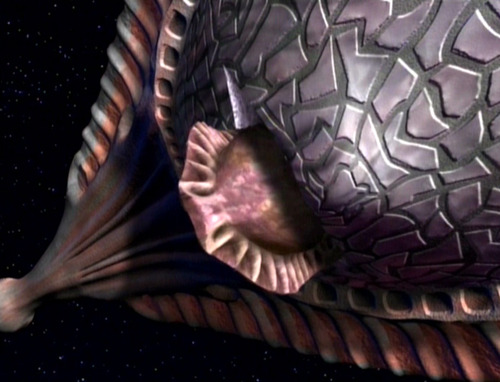
I agree it was implied in Picard’s actions and attitude that somehow saving the baby made up at least partly for killing the mother. And that’s problematic.
It might have been an improvement if the Enterprise would’ve stuck around at the end to learn and observe the aliens in order to better understand the life they took, instead of just shoving the baby over to the aliens, getting the heck out of there, and leaving the mother’s corpse floating back the way they came.
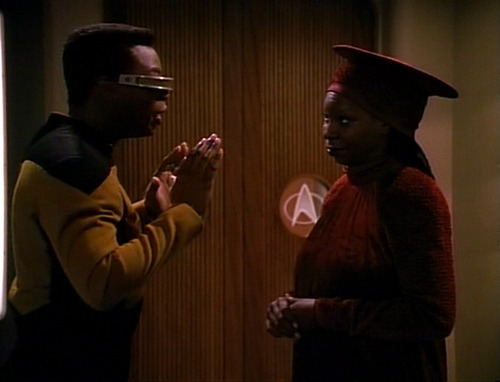
So while all the space clam drama is taking place, another disaster occurs on the ship as Geordi meets the woman of his (holo)fantasies: Dr. Leah Brahms.
Geordi really shoulda seen it coming, because Guinan warns him and everyone knows Guinan is always right.
Geordi: I guess I am a little nervous. It’s not every day a man comes face to face with his dream…You remember about a year ago when we were caught in that booby trap the Menthars set? Okay. While we were trying to get out of it, I went down to the holodeck to study an engine prototype that was made when the Enterprise was first designed. And the computer, well, it gave me an image of the engine but it also created this hologram of the designer. Doctor Leah Brahms.
Guinan: So you met a computer-simulated female.
Geordi: Yeah, but not an ordinary computer-simulated female. I mean, she was brilliant, of course, but warm, you know? Friendly. It’ was like we worked as one. I would start a sentences, she’d finish it. What I didn’t think of, she did. It was just so comfortable. Okay, I know it was just a holographic image but the computer was able to incorporate personality traits from her Starfleet record.
Guinan: You know, Geordi, everybody falls in love with a fantasy every now and then.
Geordi insists she’s not a fantasy, but when he meets the real Leah Brahms, she’s anything but warm. She attacks Geordi right off the bat for fouling up her engine designs, and fights with him about all the changes he’s made.

But Geordi is not the kind of guy to give up easily. When she gives him this look, he asks her over for dinner. After all, he’s not just relying on his charms to win her over; he also has insider information from his holoprogram.
Geordi: How about my quarters. 1900 hours? Maybe even have a bite to eat? I make a great fungilli.
Leah: I love fungilli.
Geordi (innocently): Is that right?
Geordi his quarters set up just right for dinner and he changes out of his uniform into his date night ribbed velour turtleneck, which makes me think someone in the costume department was really missing making ugly sweaters for Wesley.
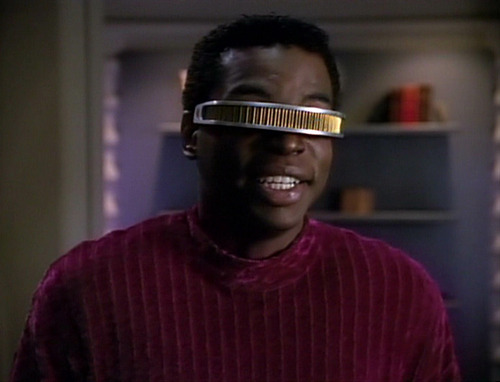
Geordi continues using his knowledge of Brahms to try to connect with her, without being up front about where he got the information:
Leah: Why would you need to see my personnel file?
Geordi: Standard procedure when guests come on board. Protocol. I mean, it was nothing specific, actually. Just, you know.
Leah: Commander La Forge, if I seem to be somewhat unyielding in my views, it’s because I care so very much about my work.
Geordi: Oh, I know.
Leah: To be honest, people find me cold, cerebral, lacking in humour.
Geordi: But they’re wrong, I assure you.
Leah: Well, I try not to be that way, but when it comes to my designs, my engines, especially the ones on the Enterprise.
Geordi: It’s like they’re your children.
Leah: Yes, exactly.
But then she excuses herself from dinner, saying she doesn’t think it’s appropriate to stay.

The next day she again notices how much he knows about her and again he stretches the truth.
Leah: Commander La Forge, ever since I came on board, there seems to be something a little peculiar about your attitude. You seem to know things about me, even though we’ve never met.
Geordi: Well, to tell you the truth, I’ve studied you. Your writings, your Starfleet file. I’ve admired you. You know, your work.
Brahms then lets him in on one key fact he missed in her files: she’s married.
Ouch.
By now Geordi should well and truly realize that his fantasy was unrealistic. Maybe he should even realize that it was more than a little creepy to create a hologram of a real person, make the hologram into his fantasy, and then use relatively private information from it to try to pick up the real woman.
Let’s see how he’s feeling:

Well Sad Geordi is definitely sad. But instead of taking responsibility, he blames Leah and the Computer:
Guinan, the woman is about as friendly as a Circassian plague cat, only cares about her work, hates what I’ve done to her engines, and to top it off she’s married. The Computer never even told me she was married.
Luckily, Guinan’s got it covered. She sets him straight;
You saw exactly what you wanted to see in the holodeck. Sure, the computer made it look like her, gave it personality, but when it came to the relationship. La Forge, you filled in the blanks. And you had a perfectly wonderful, marvellous little fantasy. until the real Leah showed up and ruined it. She’s probably done the most horrific thing one person can do to another, not live up to your expectations. So I’d take a good, hard, long look at her, La Forge. See her for who she is, not for what you want her to be.
But before Geordi can really turn things around, real Leah discovers her holographic counterpart.
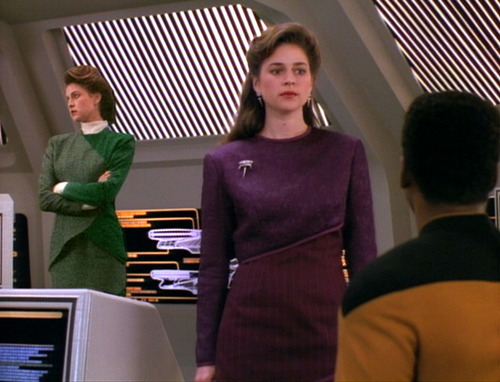
I’d be more than a little pissed off too if I saw someone had made a fantasy version of me saying things like “I’m with you every day, Geordi. Every time you look at this engine, you’re looking at me. Every time you touch it, it’s me.”
When Geordi comes in, too late, she lets him have it:
I’m outraged by this. I have been invaded. Violated. How dare you use me like this? How far did it go, anyway? Was it good for you?
Geordi insists it was just a professional collaboration, the two of them working together to solve a problem. Even though the real Leah presumably didn’t get to the part of the recording where they kissed, she doesn’t buy it.
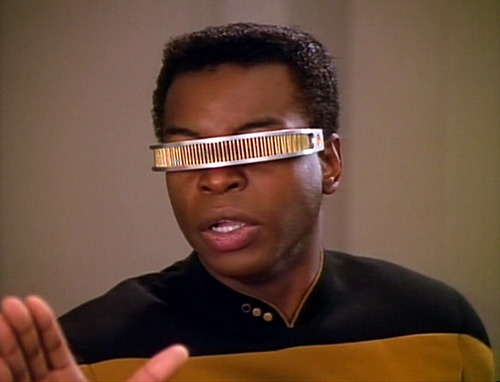
So what does Geordi do in response? Makes out like he’s the victim and she’s the bad guy:
All right, look. Ever since you came on board, you’ve been badgering me and I’ve taken it. I’ve shown you courtesy, and respect, and a hell of a lot of patience. Oh, no, no, no, wait a minute. I’ve tried to understand you. I’ve tried to get along with you. And in return, you’ve accused, tried and convicted me without bothering to hear my side of it. So, I’m guilty, okay? But not of what you think. Of something much worse. I’m guilty of reaching out to you, of hoping we could connect. I’m guilty of a terrible crime, Doctor. I offered you friendship.
Um, and badmouthed her to Guinan, and lied to her repeatedly, and created a holographic version of her whom you, at minimum, kissed. Geordi, Geordi, I’m feeling like you didn’t really let Guinan’s advice sink in.
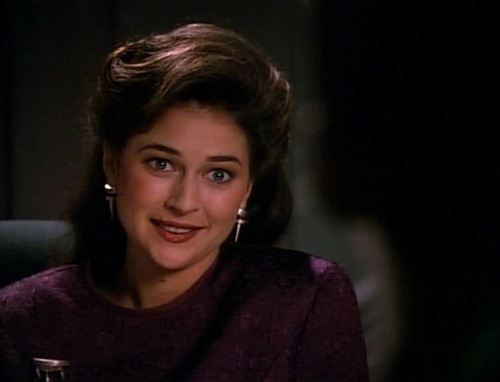
But the really wacky thing about “Galaxy’s Child” is that it seems like we’re supposed to think he’s right. In fact, Leah’s the one who ends up apologizing at the end of the episode. Somehow all of the creepy and dishonest things Geordi did are not nearly as bad as the real Leah Brahms being rude to him.
Leah: You know, I really owe you an apology.
Geordi: No, you don’t. I should have told you straight out.
Leah: Well if you had, then I never would’ve got a chance to see the look on your face when you walked in on me and me in the holodeck.
Geordi: The look on my face? How about the look on your face? I will remember that for a long, long time.
Leah: I wouldn’t change a thing. Except for the way I behaved.
I think it’s great that the episode challenges Geordi (and by extension, us) to see women as they really are, not as we might want them to be. But the message might have been less muddled if the onus was more on Geordi to apologize and understand why what he did made Leah feel violated than it was on Leah to be nicer.
Bechdel-Wallace Test: Pass. Leah Brahms asks Pavlik if there are files with the original engine schematics and Pavlik directs her to the holosuite.








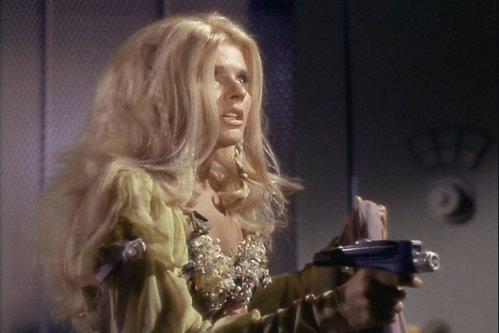
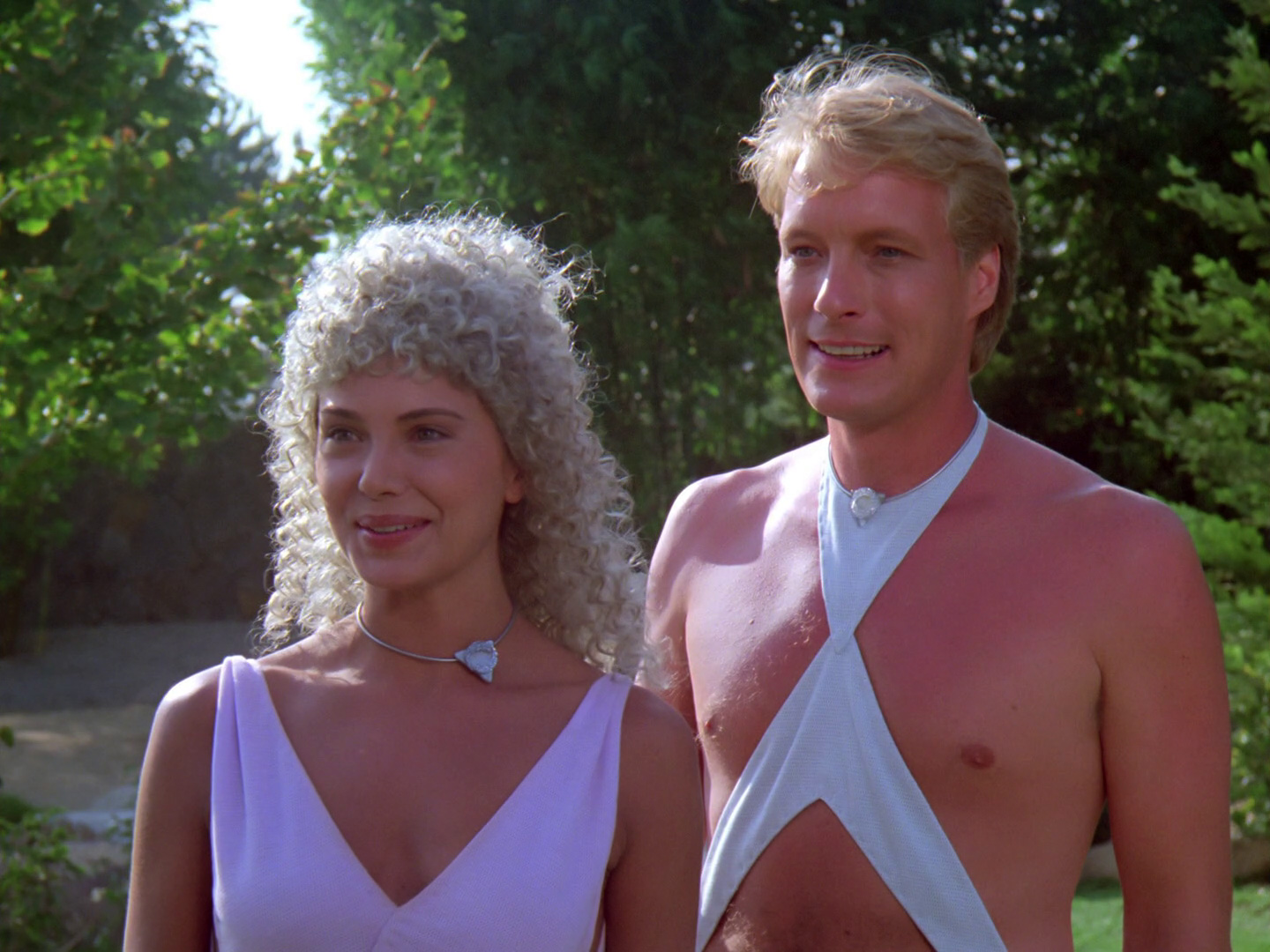

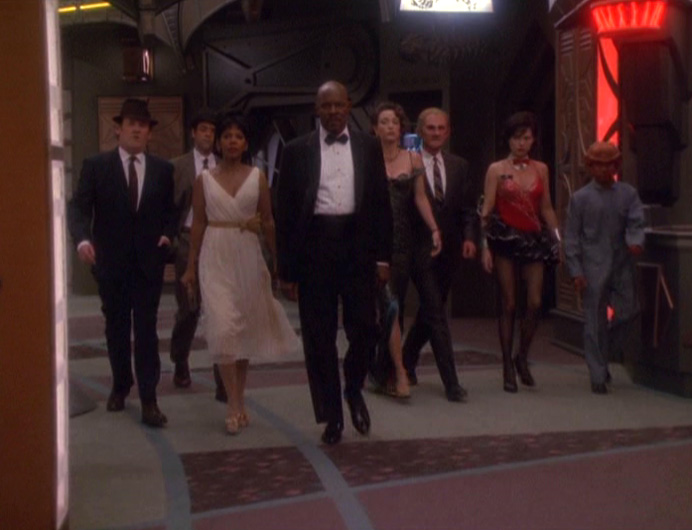
1 Comment
Add Yours →This should have been a 2 parter, with Geordi’s visit to HR and his activities during his 10 day suspension.